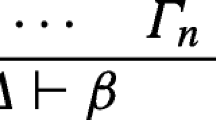Abstract
Inferences that result from exhaustification of a sentence S depend on the set of alternatives to S. In this paper, we present some inference patterns that are problematic for previous theories of alternatives and propose some structural constraints on the derivation of formal alternatives which derive the observations.
Similar content being viewed by others
References
Atlas, J.D., and S.C. Levinson. 1981. It-clefts, informativeness, and logical form: Radical pragmatics. In Radical pragmatics, ed. P. Cole, 1–61. New York: Academic Press.
Chemla E. (2009) Presuppositions of quantified sentences: Experimental data. Natural Language Semantics 17(4): 299–340
Chierchia, G., D. Fox, and B. Spector. 2012. The grammatical view of scalar implicatures and the relationship between semantics and pragmatics. In Semantics: An international handbook of natural language meaning, ed. P. Portner, C. Maienborn, and K. von Heusinger, 2297–2332. Berlin: de Gruyter.
Chomsky, N. 1995. The Minimalist Program. Cambridge, MA: MIT Press.
Crnič L. (2012) Focus particles and embedded exhaustification. Journal of Semantics 30(4): 533–558
Fox, D. 2007a. Free choice disjunction and the theory of scalar implicatures. In Presupposition and implicature in compositional semantics, ed. U. Sauerland and P. Stateva, 71–120. Basingstoke: Palgrave-Macmillan.
Fox, D. 2007b. Pragmatics in linguistic theory. MIT class notes.
Fox D., Katzir R. (2011) On the characterization of alternatives. Natural Language Semantics 19: 87–107
Groenendijk, J., and M. Stokhof. 1984. Studies on the semantics of questions and the pragmatics of answers. PhD thesis, University of Amsterdam.
Hintikka, J. 1969. Semantics for propositional attitudes. In Philosophical logic, ed. J.W. Davis et al., 21–45. Dordrecht: Reidel.
Horn, L. 1989. A natural history of negation. Chicago: The University of Chicago Press.
Katzir R. (2007) Structurally-defined alternatives. Linguistics and Philosophy 30: 669–690
Katzir, R. 2008. Structural competition in grammar. PhD thesis, MIT.
Klinedinst, N. 2004. Only scalar only. Handout presented at the ‘Presupposition and Implicature’ workshop, Paris.
Krifka M. (1995) The semantics and pragmatics of polarity items. Linguistic Analysis 25(3–4): 209–257
Kroch A. (1972) Lexical and inferred meanings for some time adverbials. Quarterly Progress Reports of the Research Laboratory of Electronics 104: 260–267
Lewis D. (1988) Relevant implication. Theoria 54(3): 161–174
Magri G. (2009) A theory of individual-level predicates based on blind mandatory scalar implicatures. Natural Language Semantics 17(3): 245–297
Magri, G. 2011. Another argument for embedded scalar implicatures based on oddness in downward entailing environments. Semantics and Pragmatics 4(6): 1–51. doi:10.3765/sp.4.6.
Penka, D. 2011. Negative indefinites. Oxford: Oxford University Press.
Romoli, J. 2012a. A problem for the structural characterization of alternatives. Unpublished manuscript, Harvard University.
Romoli, J. 2012b. Soft but strong: Neg-raising, soft triggers, and exhaustification. PhD thesis, Harvard University.
Rooth M. (1992) A theory of focus interpretation. Natural Language Semantics 1: 75–116
Sauerland U. (2004) Scalar implicatures in complex sentences. Linguistics and Philosophy 27(3): 367–391
Sauerland, U. 2012. The computation of scalar implicatures: Pragmatic, lexical or grammatical? Language and Linguistic Compass 6: 36–49.
Spector, B. 2006. Scalar implicatures: Local or global? Exhaustivity and Gricean reasoning. Unpublished manuscript, Institut Jean Nicod, Paris.
Spector, B. 2010. Scalar implicatures and grammar alternatives for focus and scalar implicatures (based on Fox and Katzir). Handout for ESSLLI, Copenhagen.
von Fintel, K., and I. Heim. 1997. Pragmatics in linguistic theory. MIT class notes.
Author information
Authors and Affiliations
Corresponding author
Rights and permissions
About this article
Cite this article
Trinh, T., Haida, A. Constraining the derivation of alternatives. Nat Lang Semantics 23, 249–270 (2015). https://doi.org/10.1007/s11050-015-9115-y
Published:
Issue Date:
DOI: https://doi.org/10.1007/s11050-015-9115-y




